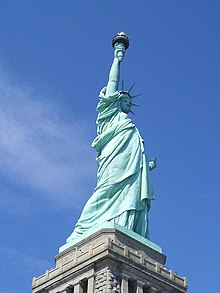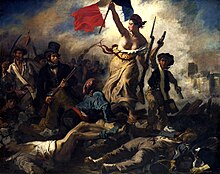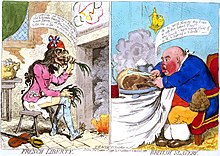Liberty
Liberty is the power to do as one likes.[1] In philosophy, the idea of liberty involves free will as contrasted with determinism.[2] In politics, liberty is freedom from government coercion.[3] In theology, liberty is freedom from the bondage of sin.[4]
Philosophy
This section needs additional citations for verification. (December 2009) |
Philosophers from earliest times have considered the question of liberty. Roman Emperor Marcus Aurelius (121–180 AD) wrote of "a polity in which there is the same law for all, a polity administered with regard to equal rights and equal freedom of speech, and the idea of a kingly government which respects most of all the freedom of the governed."[5] According to Thomas Hobbes, "a free man is he that in those things which by his strength and wit he is able to do is not hindered to do what he hath the will to do" (Leviathan, Part 2, Ch. XXI).
John Locke (1632–1704) rejected that definition of liberty. While not specifically mentioning Hobbes, he attacks Sir Robert Filmer who had the same definition. According to Locke:
- “In the state of nature, liberty consists of being free from any superior power on Earth. People are not under the will or lawmaking authority of others but have only the law of nature for their rule. In political society, liberty consists of being under no other lawmaking power except that established by consent in the commonwealth. People are free from the dominion of any will or legal restraint apart from that enacted by their own constituted lawmaking power according to the trust put in it. Thus, freedom is not as Sir Robert Filmer defines it: ‘A liberty for everyone to do what he likes, to live as he pleases, and not to be tied by any laws.’ Freedom is constrained by laws in both the state of nature and political society. Freedom of nature is to be under no other restraint but the law of nature. Freedom of people under government is to be under no restraint apart from standing rules to live by that are common to everyone in the society and made by the lawmaking power established in it. Persons have a right or liberty to (1) follow their own will in all things that the law has not prohibited and (2) not be subject to the inconstant, uncertain, unknown, and arbitrary wills of others.”[6]

Immanuel Kant, was the first to recognize the difference between liberty as the freedom to act and liberty as the absence of coercion. In his book, Two Concepts of Liberty, Isaiah Berlin formally framed the differences between these two perspectives as the distinction between two opposite concepts of liberty: positive liberty and negative liberty. The latter designates a negative condition in which an individual is protected from tyranny and the arbitrary exercise of authority, while the former refers to having the means or opportunity, rather than the lack of restraint, to do things.
John Stuart Mill offered insight into the notions of soft tyranny and mutual liberty with his harm principle.[7] It can be seen as important to understand these concepts when discussing liberty since they all represent little pieces of the greater puzzle known as freedom. In a philosophical sense, it can be said that morality must supersede tyranny in any legitimate form of government. Otherwise, people are left with a societal system rooted in backwardness, disorder, and regression.
Politics
History


Urukagina, the king of Lagash, established the first known legal code to protect citizens from the rich and powerful. Known as a great reformer, Urukagina established laws that forbade compelling the sale of property and required the charges against the accused to be stated before any man accused of a crime could be punished. This is the first known example of any form of due process in the history of humanity. However, his laws were otherwise typically brutal for Mesopotamia, including the stoning of women for having multiple husbands.
The modern concept of political liberty has its origins in the Greek concepts of freedom and slavery.[8] To be free, to the Greeks, was to not have a master, to be independent from a master (to live like one likes).[9] That was the original Greek concept of freedom. It is closely linked with the concept of democracy, as Aristotle put it:
"This, then, is one note of liberty which all democrats affirm to be the principle of their state. Another is that a man should live as he likes. This, they say, is the privilege of a freeman, since, on the other hand, not to live as a man likes is the mark of a slave. This is the second characteristic of democracy, whence has arisen the claim of men to be ruled by none, if possible, or, if this is impossible, to rule and be ruled in turns; and so it contributes to the freedom based upon equality."[10]
This applied only to free men. In Athens, for instance, women could not vote or hold office and were legally and socially dependent on a male relative.[11]
The populations of the Persian Empire enjoyed some degree of freedom. Citizens of all religions and ethnic groups were given the same rights and had the same freedom of religion, women had the same rights as men, and slavery was abolished (550 BC). All the palaces of the kings of Persia were built by paid workers in an era when slaves typically did such work.[12]
In the Buddhist Maurya Empire of ancient India, citizens of all religions and ethnic groups had some rights to freedom, tolerance, and equality. The need for tolerance on an egalitarian basis can be found in the Edicts of Ashoka the Great, which emphasize the importance of tolerance in public policy by the government. The slaughter or capture of prisoners of war was also condemned by Ashoka.[13] Slavery was also non-existent in the Maurya Empire.[14] However, according to Hermann Kulke and Dietmar Rothermund, "Ashoka's orders seem to have been resisted right from the beginning."[15]
Roman law also embraced certain limited forms of liberty, even under the rule of the Roman Emperors. However, these liberties were accorded only to Roman citizens. Still, the Roman citizen enjoyed a combination of positive liberty (the right to a trial, a right of appeal, law and contract enforcement) and negative liberty (unhindered right to contract and the right to not be tortured). Many of the liberties enjoyed under Roman law endured through the Middle Ages, but were enjoyed solely by the nobility, never by the common man. The idea of unalienable and universal liberties had to wait until the Age of Enlightenment.
Social contract


The social contract theory, invented by Hobbes, John Locke and Rousseau, were among the first to provide a political classification of rights, in particular through the notion of sovereignty and of natural rights. The thinkers of the Enlightenment reasoned the assertion that law governed both heavenly and human affairs, and that law gave the king his power, rather than the king's power giving force to law. The divine right of kings was thus opposed to the sovereign's unchecked auctoritas. This conception of law would find its culmination in Montesquieu's thought. The conception of law as a relationship between individuals, rather than families, came to the fore, and with it the increasing focus on individual liberty as a fundamental reality, given by "Nature and Nature's God," which, in the ideal state, would be as expansive as possible.
The Enlightenment created then, among other ideas, liberty: that is, of a free individual being most free within the context of a state that provides stability of the laws. Within the context of social liberty, in On Liberty, John Stuart Mill sought to define the "...nature and limits of the power which can be legitimately exercised by society over the individual,” and as such, he describes an inherent and continuous antagonism between liberty and authority and thus, the prevailing question becomes "how to make the fitting adjustment between individual independence and social control".[16]
Modern perspectives
| Part of a series on |
| Liberalism |
|---|
 |
The modern conceptions of democracy, whether representative democracies or other types of democracies, are all found on the Rousseauist idea of popular sovereignty.[original research?]
Liberalism is a political current embracing several historical and present-day ideologies that claim defense in relation to external authority and coercion. Within this context, the government has a responsibility to ensure individual liberty while at the same time improving the situation of those with the least advantage. In this sense, we can understand economic liberalism as the right of the individual to contract, trade and operate in a market free of constraint and social liberalism as the belief that liberalism should include social justice. Both are core political issues, and are highly contentious.[17]
Article 3 of the Universal Declaration of Human Rights states that "Everyone has the right to life, liberty, and security of person."
United States
In the United States Supreme Court decision Griswold v. Connecticut, Justice William O. Douglas argued that liberties relating to personal relationships, such as marriage, have a unique primacy of place in the hierarchy of freedoms.[18] Jacob M. Appel has summarized this principle:
I am grateful that I have rights in the proverbial public square – but, as a practical matter, my most cherished rights are those that I possess in my bedroom and hospital room and death chamber. Most people are far more concerned that they can control their own bodies than they are about petitioning Congress.[19]
A school of thought popular among U.S. libertarians holds that there is no tenable distinction between the two sorts of liberty – that they are, indeed, one and the same, to be protected (or opposed) together. In the context of U.S. constitutional law, for example, they point out that the constitution twice lists "life, liberty, and property" without making any distinctions within that troika.
Anarcho-Individualists, such as Max Stirner, demanded the utmost respect for the liberty of the individual. Some in the U.S. see protecting the ideal of liberty as a conservative policy, because this would conform to the spirit of individual liberty that they consider is at the heart of the American constitution. Some think liberty is almost synonymous with democracy, at least in one sense of that word, while others see conflicts or even opposition between the two concepts, with democracy being nothing more than the tyranny of the majority.[citation needed]
Republican liberty
According to republican theorists of freedom, like the historian Quentin Skinner or the philosopher Philip Pettit, one's liberty should not be viewed as the absence of interference in one's actions, but as non-dependence. According to this view, that originates in the Roman Digest, to be a liber homo, a free man, means being in a state of non-dependence from another's arbitrary will. The second step of the argument of these neo-Roman writers, like Machiavelli, was that you have to be a member of a free self-governing civil association, a republic, if you are to enjoy individual liberty.
The predominance of this view of liberty among parliamentarians during the English Civil War resulted to the creation of the liberal concept of freedom as non-interference in Thomas Hobbes's Leviathan.
Historical writings on liberty
- John Locke (1689). Two Treatises of Government: In the Former, the False Principles, and Foundation of Sir Robert Filmer, and His Followers, Are Detected and Overthrown. the Latter Is an Essay Concerning the True Original, Extent, and End of Civil Government. London: Awnsham Churchill.
- Frédéric Bastiat (1850). The Law. Paris: Guillaumin & Co.
- John Stuart Mill (1859). On Liberty. London: John W Parker and Son.
- James Fitzjames Stephen (1874). Liberty, Equality, Fraternity. London: Smith, Elder, & Co.
See also
References
- ^ "The condition of being able to act or function without hindrance or restraint; faculty or power to do as one likes." Oxford English Dictionary.[1]
- ^ "The fact of not being controlled by or subject to fate; freedom of will." Oxford English Dictionary.[2]
- ^ "Each of those social and political freedoms which are considered to be the entitlement of all members of a community; a civil liberty." Oxford English Dictionary.[3]
- ^ "Freedom from the bondage or dominating influence of sin, spiritual servitude, worldly ties." Oxford English Dictionary.[4]
- ^ Marcus Aurelius, "Meditations", Book I, Wordsworth Classics of World Literature, ISBN 1853264865
- ^ Two Treatises on Government: A Translation into Modern English, ISR, 2009, p. 76
- ^ John Stuart Mill, On Liberty and Utilitarianism, (New York: Bantam Books, 1993), 12–16.
- ^ Rodriguez, Junius P. (2007) The Historical Encyclopedia of World Slavery: A-K ; Vol. II, L-Z,
- ^ Mogens Herman Hansen, 2010, Democratic Freedom and the Concept of Freedom in Plato and Aristotle
- ^ Aristotle, Politics 6.2
- ^ Mikalson, Jon (2009). Ancient Greek Religion (2nd ed.). Wiley-Blackwell. p. 129. ISBN 978-1405181778.
- ^ Arthur Henry Robertson, John Graham Merrills (1996). Human Rights in the World: An Introduction to the Study of the International Protection of Human Rights. Manchester University Press. ISBN 0-7190-4923-7.
- ^ Amartya Sen (1997). Human Rights and Asian Values. ISBN 0-87641-151-0.
- ^ Arrian, Indica:
"This also is remarkable in India, that all Indians are free, and no Indian at all is a slave. In this the Indians agree with the Lacedaemonians. Yet the Lacedaemonians have Helots for slaves, who perform the duties of slaves; but the Indians have no slaves at all, much less is any Indian a slave."
- ^ Hermann Kulke, Dietmar Rothermund (2004). "A history of India". Routledge. p.66. ISBN 0-415-32920-5
- ^ Mill, J.S. (1869)., "Chapter I: Introductory", On Liberty. {http://www.bartleby.com/130/1.html}
- ^ Rawls, J. (1971). A Theory of Justice. Cambridge, MA: Harvard University Press., p. 13
- ^ GRISWOLD v. CONNECTICUT U.S. Supreme Court 381 U.S. 479 (1965) Decided June 7, 1965
- ^ A Culture of Liberty
External links
 Media related to Liberty at Wikimedia Commons
Media related to Liberty at Wikimedia Commons
Template:Articles of the Universal Declaration of Human Rights
